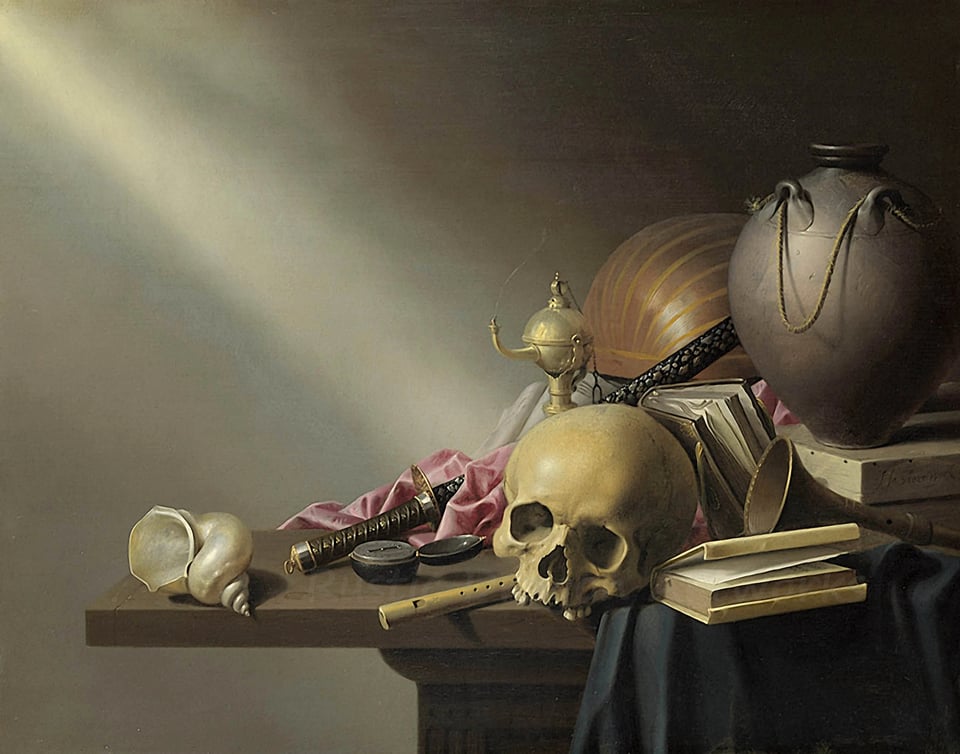Episode #44
A friend pointed to this remarkably irenic passage from Bavinck's Certainty of Faith: "The Catholic righteousness by good works is vastly preferable to a Protestant righteousness by good doctrine. At least righteousness by good works benefits one’s neighbor, whereas righteousness by good doctrine only produces lovelessness and pride. Furthermore, we must not blind ourselves to the tremendous faith, genuine repentance, complete surrender and the fervent love for God and neighbor evident in the lives and work of many Catholic Christians. The Christian life is so rich that it develops its full glory not just in a single form or within the walls of one church."
A heavy drop of rain grazed Hladik's temple and rolled slowly down his cheek; the sergeant called out the final order.
The physical universe stopped.
The weapons converged upon Hladik, but the men who were to kill him were immobile. The sergeant's arm seemed to freeze, eternal, in an inconclusive gesture. On one of the paving stones of the yard, a bee cast a motionless shadow. As though in a painting, the wind had died. Hladik attempted a scream, a syllable, the twisting of a hand. He realized that he was paralyzed. He could hear not the slightest murmur of the halted world. I am in hell, he thought, I am dead. Then I am mad, he thought. And then, time has halted. Then he reflected that if that were true, his thoughts would have halted as well. He tried to test this conjecture: he repeated (without moving his lips) Virgil's mysterious fourth eclogue. He imagined that the now-remote soldiers must be as disturbed by this as he was; he wished he could communicate with them. He was surprised and puzzled to feel neither the slightest weariness nor any faintness from his long immobility. After an indeterminate time, he slept. When he awoke, the world was still motionless and muffled. The drop of water still hung on his cheek; on the yard, there still hung the shadow of the bee; in the air the smoke from the cigarette he'd smoked had never wafted away. Another of those "days" passed before Hladik understood.
He had asked God for an entire year in which to finish his work; God in His omnipotence had granted him a year. God had performed for him a secret miracle: the German bullet would kill him, at the determined hour, but in Hladik's mind a year would pass between the order to fire and the discharge of the rifles. From perplexity Hladik moved to stupor, from stupor to resignation, from resignation to sudden gratitude.
He had no document but his memory; the fact that he had to learn each hexameter as he added it imposed upon him a providential strictness, unsuspected by those who essay and then forget vague provisional paragraphs. He did not work for posterity, nor did he work for God, whose literary preferences were largely unknown to him. Painstakingly, motionlessly, secretly, he forged in time his grand invisible labyrinth. He re-did the third act twice. He struck out one and another overly obvious symbol—the repeated chimings of the clock, the music. No detail was irksome to him. He cut, condensed, expanded; in some cases he decided the original version should stand. He came to love the courtyard, the prison; one of the faces that stood before him altered his conception of Romerstadt's character. He discovered that the hard-won cacophonies that were so alarming to Flaubert are mere visual superstitions— weaknesses and irritations of the written, not the sounded, word.... He completed his play; only a single epithet was left to be decided upon now. He found it; the drop of water rolled down his cheek.
He began a maddened cry, he shook his head, and the fourfold volley felled him.
Jaromir Hladik died on the twenty-ninth of March, at 9:02a.m.
Jorge Luis Borges “The Secret Miracle”
The supreme power, wisdom, and goodness of the Creator shine forth in created things as the senses reveal these attributes to the interior faculty in a threefold way: by assisting the mind as it investigates by reason, believes by faith, and speculates by intellect. Speculation regards things in their actual existence, faith in their habitual course , and investigation in their potential excellence.
Bonaventure The Journey of the Mind to God
The Surgeon General released an advisory last week concluding that social disconnection is as bad for your health as smoking 15 cigarettes a day. Loneliness has reached epidemic proportions in the U.S., and its physical effects are making people sick.
Ann Kowal Smith "Loneliness May Be As Dangerous As Smoking. Here’s Why Employers Should Care"
Study here.

Harmen Steenwijck - Vanitas Still-Life